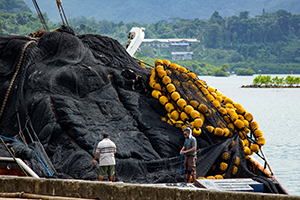President amends decree on commercial fishing vessels to prevent COVID-19 risk
- Details
- Category: News
- Published: Thursday, 23 April 2020 23:08
- Written by Bill Jaynes
- Hits: 22611
By Bill Jaynes
The Kaselehlie Press
April 3, 2020
 Federated States of Micronesia—FSM President David Panuelo today decreed new actions aimed at lowering the risk of introduction of COVID-19 to the FSM by fishing activities conducted within the FSM’s exclusive economic zone (EEZ). The decree specifies new temporary rules for transshipment of fish by commercial fishing vessels.
Federated States of Micronesia—FSM President David Panuelo today decreed new actions aimed at lowering the risk of introduction of COVID-19 to the FSM by fishing activities conducted within the FSM’s exclusive economic zone (EEZ). The decree specifies new temporary rules for transshipment of fish by commercial fishing vessels.
The decree additionally bans the public from approaching any commercial fishing vessel. It prohibits both the public and commercial fishers from bartering for, trading, or locally selling fish caught on commercial fishing vessels. The press release on the decree points out that any person who violates the decree, whether they are a commercial fisherman or a local resident is subject to the penalties of Title 11, Chapter 8, Section 803. That section says, “Any person who, during a state of emergency, fails to comply with restrictions imposed by proclamation of the President under section 802 of this chapter (emergency declarations) commits a crime, and upon conviction, shall be punished by imprisonment for not more than five years.”
For a reason that is not explained in the decree, purse seine vessels will still be allowed to transship in Kosrae. Nothing precludes FSM flagged vessels from also transshipping in Kosrae but if they did so, they would also still have to return to their Pohnpei bases for supplies. All other transshipment will be required under yet to be released regulations by NORMA (National Oceanic Resource Management Agency) to transship their fish for market at sea in a designated area in territorial waters beyond the three nautical miles from baselines.
Longline fishing vessels are still allowed to come to port for transshipment purposes subject to additional measures established by NORMA for the avoidance of COVID-19 and also only if they follow additional guidelines established in the decree. Longline vessels that transship at port must have had no contact at any time prior to the transshipment. They must have observed the 14 days quarantine at sea and no crewmembers will be allowed to disembark at port. The 14 day quarantine is counted from the date of last contact with other humans.
The decree says that domestic fishing vessels are allowed to call port in the FSM States for repair, maintenance and provisioning purposes but all of that must be accomplished at anchorage areas and not at the docks. Domestic fishing vessels are vessels that are flagged in the FSM or that have a base of operation anywhere in the FSM States.
For vessels that are required to transship at sea, Immigration and Customs clearance procedures will be conducted electronically.
Vessels are now required to give 72 hours advanced notice of transshipment to the FSM Department of Justice and to NORMA. Information they must submit in advance must include the body temperatures of each crewmembers taken at 24 hour intervals prior to transshipment.






